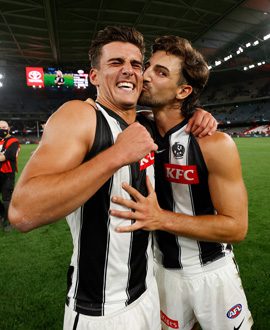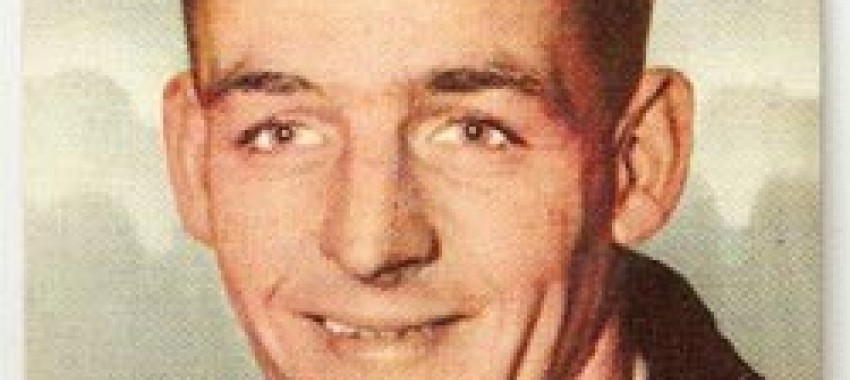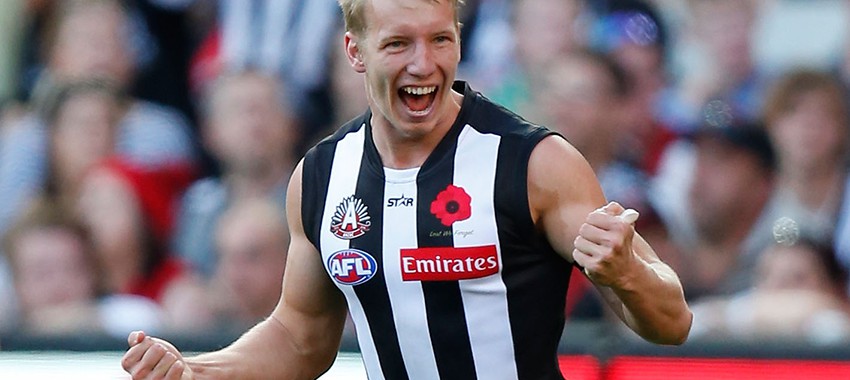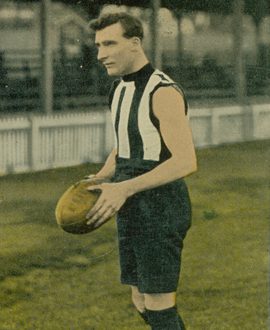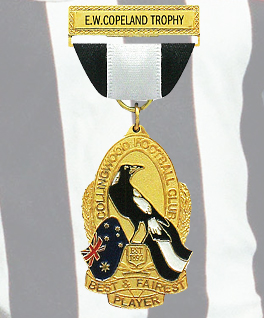
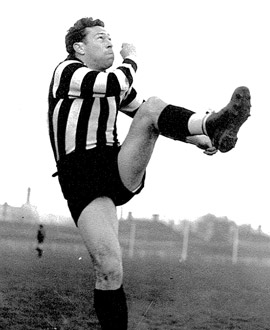
It was only one line in a tiny, single-paragraph story in the Sporting Globein May of 1943. But the brevity of the reference shouldn't disguise its significance. "On Saturday, the 15-year-old son of former Magpie Bill Twomey, former star wingman, signed up [with Collingwood]."
That piece of news was significant for two reasons. The first is that it represented a shrewd piece of recruiting by the Pies. Young Bill had been born in what the VFL termed 'unallocated' territory, so he could have been signed by any club. But Collingwood's quick and decisive action in signing the youngster put paid to any chance of him going elsewhere. The far greater significance was that it secured for the Pies a player who would go on to win a Copeland Trophy and captain the club, and who would thrill and frustrate the fans in equal measure throughout the long and colourful career that would follow.
The perplexing nature of Twomey's career is perhaps best summed up by an eight-week period late in the 1948 season. He had been in a terrible slump for weeks: Collingwood swung him through just about every position on the ground, but all to no avail. On September 8, the Sporting Globesaid Twomey was playing as if he had lost interest in football: "Twomey, they say, is worried about his football He has been upset and can't strike the vein. He's only 20 yet in four brilliant years has become the finest centre in Australia. But in his present mood he's not equal to holding a place in the side."
Three days after that story appeared, things seemed to be getting worse. His first half in the first semi-final against Footscray was woeful: he injured his leg, lost confidence and askedto be taken off. The selectors refused, and instead sent him to the forward pocket – where he promptly marked everything in sight, kicked eight goals and won the game almost single-handedly. So sensational was his performance in the second half that the Sporting Globe declared the Pies had found "their greatest match-winning forward since Ron Todd". But two weeks later Twomey had such little influence on the preliminary final against Melbourne that he had to be moved away from full-forward.
Welcome to the roller-coaster football world of Bill Twomey Jnr – undoubtedly one of the most brilliant players and biggest enigmas in Collingwood history.
This was a player who burst onto the scene and quickly came to be regarded as the best centreman in the game. He finished second in the Copeland in that role in just his second season, a year in which St Kilda's Harold Bray said: "He is the best man I have met in my games in the centre. He is a champion, and has something that I have not, and no matter how I tried or what tactics I adopted he was always a thought ahead of me." Twomey was just 18 then. The next year the Sporting Globe described him as "the greatest propelling force in football".
Yet he was potent enough as a forward to kick 11 goals against Footscray in 1950 and nine against South Melbourne in 1953, and to have Fitzroy full-back Vic Chanter rank him behind only the great John Coleman as the toughest full-forward he'd ever played against. But one of Twomey's best performances came at centre half-back in 1949, when he volunteered to take the post after Neil Mann went down injured. Despite having missed nine weeks through injury himself, Twomey starred as the Magpies won a crucial game by just three points.
Twomey was a seriously good footballer who could play – and star – just about anywhere. He was superbly built, exceptionally quick, had a spectacular leap, strong hands and superb ball skills, and was a magnificent, raking left-footed kick. He had so much natural talent that he was the envy of most of his teammates. He was one of the most spectacular players ever to pull on a Collingwood jumper, unstoppable at his best and a match-winner on his day.
But he was also injury-prone and incredibly unpredictable. After those first two years where he took the competition by storm as a teenager, young Bill never got a clear run at football without injuries. In one horror three-year stretch across 1949-51 when he should have been in his prime, he managed only 20 games in total. In the end he missed almost a third of his possible games through injury. It was unbelievably frustrating not only for Bill but also for his coaches, teammates and fans.
Sporting Novels once labelled him the 'Collingwood Cannonball' – 'a dazzling comet amongst the stars of the League'. "He is a flashing thoroughbred amongst footballers, a lithe-limbed Redcraze, a superbly graceful and fast-moving combination of smooth-working muscle and sinew, nerve and tendon. But like all thoroughbreds he is more subject to injury than coarser beings."
And if it wasn't injuries, it was often form. He could star one day, or for a few weeks, then suddenly go missing. Sometimes the downturn would even happen within games. He worried too much about things he couldn't control, and could get down on himself far too easily. He was very much a confidence player, but that confidence was easily disturbed.
The result was a player who came to be seen by some fans as fragile and not committed or mentally tough enough for the rigours of VFL football. Some of his teammates also felt that his first coach, Jock McHale, developed a 'set' against him for the same reasons. Twomey actually retired for a while in 1951 after he was dropped, but came back later in the year and ended up playing a key role in the 1953 Premiership. He also won the Copeland in 1956 and was named captain in 1957.
Despite those achievements, there was still a sense that Bill Twomey never quite delivered on his early promise. He had been a child prodigy, walking into and starring with the Collingwood team as a 17-year-old, and his first two seasons had been simply breathtaking. Many thought he'd struggled with the expectations and pressures that followed such a stellar start to his career; others blamed the injuries, or his temperament. But maybe he was just destined to be one of those players who was always going to tantalise with frequent bursts of genius, without being able to add consistency to the mix. And if that's the price football had to pay to see the best of Bill Twomey Jnr, then it was probably worth it.
- Michael Roberts
CFC Career Stats
| Season played | Games | Goals | Finals | Win % |
|---|---|---|---|---|
| 1945-1958 | 189 | 154 | 17 | 65.6% |
CFC Season by Season Stats
| Season | GP | GL | B | K | H | T | D | Guernsey No. | ||
|---|---|---|---|---|---|---|---|---|---|---|
Other CFC Games
| Team | League | Years Played | Games | Goals |
|---|---|---|---|---|
| Collingwood | Reserves | 1949 - 1958 | 2 | 0 |
| Collingwood | Night/Pre-season | 1957 | 1 | 3 |
Awards









